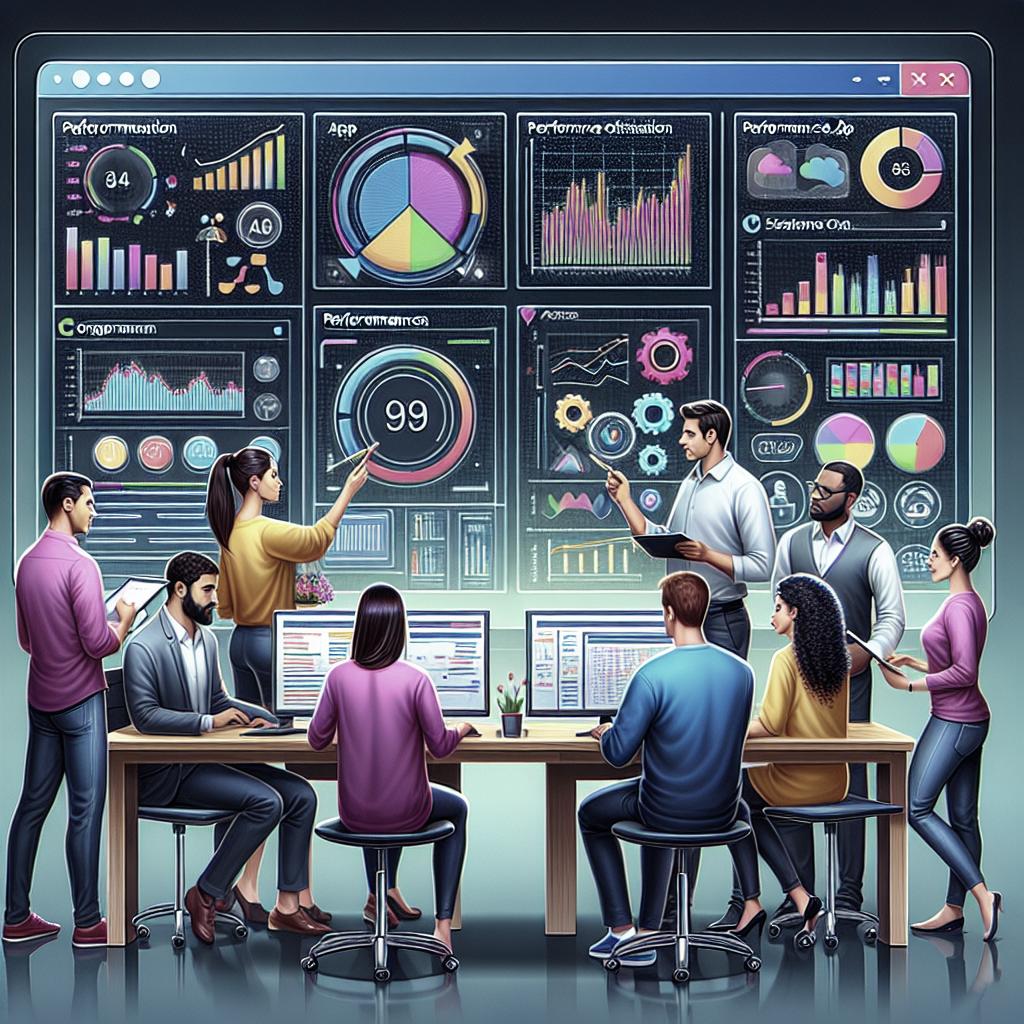Custom Dashboards for Business Apps
In today’s data-driven business environment, the ability to visualize and interpret data efficiently is crucial for decision-making. Custom dashboards play an integral role in transforming raw data into meaningful insights for businesses. This comprehensive guide will explore the evolution and importance of custom dashboards, delving into personalized data visualization, streamlined reporting, and more. Furthermore, we’ll introduce you to the Infizo Builder, a tool that enhances dashboard creation through an intuitive interface and comprehensive features like real-time data integration and advanced security. Join us as we explore how these dashboards can revolutionize your business analytics strategy.
What do you want to do?
Your journey with custom dashboards starts by identifying your business’s specific needs and objectives. Before you begin crafting your dashboard, ask yourself: what insights do you need to gain from your data? Are you focusing on improving sales performance, analyzing customer behavior, tracking financial KPIs, or monitoring operational efficiency? Clearly defined objectives will guide the customization process and ensure that your dashboard meets your exact needs.
Once you have a list of objectives, consider the sources of data that will feed into your dashboard. Will you be consolidating data from CRM software, financial systems, or social media analytics? Understanding these sources is a foundational step in creating a custom solution tailored to your business requirements, leading to effective data-driven strategies that boost your company’s performance.
Learn how to use a dashboard
Understanding how to utilize a dashboard is essential for extracting maximum value from your data. Begin by familiarizing yourself with your dashboard’s user interface and navigation features. Most dashboards offer a variety of widgets and tools to aid in data visualization; learn how to select and apply these to suit your analysis needs. Whether you are exploring a sales funnel or customer demographic data, knowing how to curate your view empowers you to gain sharper insights.
Once comfortable with navigation, delve into the metrics and KPIs that your dashboard tracks. Prioritize the data points that align closely with your business goals. Regularly review and adjust these metrics as your business evolves to ensure your analysis remains relevant and impactful. Mastering your dashboard’s functionalities is a step towards leveraging it as a robust analytical tool within your business operations.
Create a dashboard
Creating a custom dashboard begins with choosing the right platform that offers the flexibility and tools necessary for your data visualization needs. These platforms, like Tableau or Power BI, provide a wealth of customization options, allowing users to design widgets, charts, and graphs that represent their data effectively. The design phase should focus on a clean layout that presents data in an intuitive and user-friendly manner.
As you build your dashboard, pay attention to aesthetics and functionality. Incorporate interactive elements that allow users to drill down into data layers for detailed analysis. Ensure that your dashboard is uncluttered and easy to interpret, avoiding overwhelming users with too much information. Effective dashboard creation is a synthesis of design and practicality that results in a tool that drives informed decision-making across the business.
What is the Importance of Custom Dashboards in Business Analytics?
1. Personalized Data Visualization
Custom dashboards allow businesses to tailor their data presentation to specific needs. By selecting which data points are most relevant and how they should be displayed, businesses can create visuals that are immediately understandable to their team. This personalization makes data accessible, breaking down complex datasets into easily digestible insights that enhance operational efficiency.
Furthermore, personalized visualization aligns with roles and objectives within the organization, providing stakeholders with insights that are directly applicable to their projects. This ensures everyone, from executives to entry-level staff, is on the same page and working toward shared objectives.
2. Improved Decision-Making
Custom dashboards provide the clarity and focus necessary for data-driven decision-making. By surfacing the most critical information and presenting it clearly, decision-makers can respond rapidly to emerging trends and issues. This real-time insight drives strategic initiatives and bolsters the company’s ability to stay competitive in fast-paced markets.
Moreover, with accurate and timely data at their fingertips, leaders can make informed choices that minimize risks and optimize outcomes. Custom dashboards serve as a decisive tool that supports strategic planning and operational agility.
3. Enhanced Collaboration
Dashboards are not just for individual use; they enhance team collaboration by providing a unified platform for data visibility. When everyone has access to the same data insights, teams can collaborate more effectively, align strategies, and drive collective action. This transparency fosters a culture of openness and shared understanding within the organization.
The ability to share dashboards with team members and stakeholders means that everyone can contribute to the analysis and interpretation of data. This collective effort can lead to more comprehensive insights and greater innovative capacity within teams.
4. Real-Time Monitoring
Custom dashboards enable businesses to perform real-time monitoring of key performance indicators and other critical metrics. This functionality is essential for timely decision-making and for responding effectively to immediate challenges or opportunities. By providing a live view of business operations, dashboards can trigger alerts and prompt actions as needed.
For businesses operating in dynamic environments, the ability to track progress and performance in real-time is invaluable. Whether it’s monitoring sales figures or customer engagement statistics, real-time data provides the agility needed to maintain a competitive edge.
5. Streamlined Reporting
One of the significant advantages of custom dashboards is their ability to streamline reporting processes. By consolidating data from multiple sources into a single interface, businesses can generate comprehensive and coherent reports without the complexities of traditional reporting methods.
This not only saves time but also reduces the potential for errors that can occur with data duplication and manual compilation. Streamlined reporting enables teams to focus on analysis and strategy rather than data preparation, enhancing overall productivity.
6. User-Friendly Design
Custom dashboards are designed with the user in mind, offering intuitive interfaces that require minimal training to operate. A well-designed dashboard provides a seamless user experience, allowing users to access the information they need quickly and efficiently.
By prioritizing ease of use, businesses ensure that their teams can engage with the data effectively, driving higher usage rates and better data literacy across the organization. A user-friendly design is a fundamental aspect of a successful dashboard that encourages dynamic interaction with data.
7. Scalability and Flexibility
As businesses grow, so do their data needs. Custom dashboards offer scalability and flexibility, allowing them to adapt to changing requirements. Whether you need to add new data sources, metrics, or user access, a scalable dashboard can accommodate these changes seamlessly.
This adaptability is crucial for businesses that evolve and expand over time, ensuring that their analytical tools remain effective and relevant. A flexible dashboard framework supports long-term business growth by continually aligning with organizational objectives.
How Infizo Builder Enhances Custom Dashboard Creation
1. Intuitive Drag-and-Drop Interface
Infizo Builder excels with its intuitive drag-and-drop interface, simplifying the process of creating custom dashboards. Users can effortlessly arrange widgets and data elements, creating a layout that best suits their analytical needs without requiring coding expertise.
This accessibility empowers a broader range of users to engage in dashboard creation, democratizing data insights across the organization. The intuitive interface is pivotal in ensuring that users of varying technical backgrounds can contribute to data visualization efforts.
2. Extensive Customization Options
Customization is a cornerstone of Infizo Builder’s offering, providing users with countless options to tailor their dashboards. From color schemes to chart types and data source integration, the platform offers the versatility needed to create personalized dashboards that accurately reflect the user’s data story.
This level of customization ensures that dashboards are not only functional but also aesthetically aligned with the brand identity or personal preferences, elevating the overall user experience.
3. Real-Time Data Integration
Infizo Builder supports real-time data integration, allowing businesses to maintain a constant pulse on their operations. Real-time insights empower users to monitor metrics as they occur, enabling timely interventions and strategic adjustments.
This feature is especially beneficial in industries where up-to-date information is critical, such as finance, retail, and digital marketing, ensuring that leaders have access to the latest data for decision-making.
4. Seamless Integration with Multiple Data Sources
Infizo Builder offers seamless integration with a multitude of data sources, including cloud services, on-premise databases, and third-party applications. This capability allows businesses to consolidate diverse datasets into a unified dashboard view.
By unifying data across systems, businesses can generate holistic insights that are more accurate and comprehensive, supporting strategic cross-functional initiatives and better alignment between departments.
5. Collaboration and Sharing Features
Collaboration is enhanced through Infizo Builder’s robust sharing features, which facilitate teamwork through shared access to dashboards. Teams can comment on datasets, share insights, and collaborate on data interpretation in real-time, fostering a collaborative analytical culture.
This feature is particularly beneficial for organizations with remote or distributed teams, allowing seamless information exchange irrespective of location.
6. Scalability to Meet Growing Needs
Infizo Builder is designed to grow with your business, offering scalability that matches your expanding data requirements. Whether you’re managing more data or bringing in additional users, the platform scales effortlessly, supporting growth without the need for significant overhaul.
This scalability ensures long-term utilization of the dashboard tool, making it a sustainable solution as data demands increase alongside business growth.
7. Advanced Security Features
Security is a top priority for Infizo Builder, which integrates advanced security features to protect sensitive data. From user access controls to data encryption, the platform ensures that your business insights remain confidential and secure.
This commitment to security allows organizations to focus on data analysis without worrying about potential breaches or unauthorized access, providing peace of mind and preserving data integrity.
Lessons Learned
| Key Aspect | Description |
|---|---|
| What do you want to do? | Identify objectives and data sources before dashboard creation. |
| Learn how to use a dashboard | Familiarize with interface and prioritize relevant data metrics. |
| Create a dashboard | Focus on platform choice, design aesthetics, and functionality. |
| Importance of Custom Dashboards | Offers personalized visualization, improved decision-making, and collaboration benefits. |
| Infizo Builder Enhancements | Provides an intuitive interface, customization, integration, scalability, and security. |


